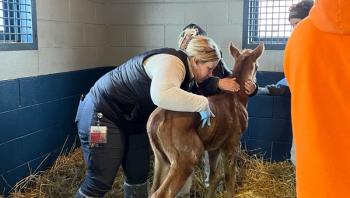
AVMA buys island
Schaumburg, ill. - The American Veterinary Medical Association wants to have a real presence in a pretend world.
SCHAUMBURG, ILL. — The American Veterinary Medical Association wants to have a real presence in a pretend world.
Last month, the group announced it spent $1,600 to purchase an island in Second Life, the online 3-D community where people can buy virtual property, take virtual jobs and virtually learn about veterinary medicine.
While AVMA's plans to populate its island are in their infancy, other agencies and institutions appear far ahead. The Centers for Disease Control and Prevention, National Institutes of Health and The Ohio State University all have a presence. San Jose State University's virtual campus even features a heart-sound simulation lab.
Dr. Thea Jones, owner of two Second Life avatars (a computer user's 3-D self model), says a trip to the National Oceanic and Atmospheric Administration allows users to experience what it's like to face a tsunami, and Vassar Island includes a replica of the Sistine Chapel that users can tour with floor-to-ceiling views.
"It's easy to be carried away by the fun side, but there is a lot of educational stuff," says Jones, AVMA's online managing editor. "Our involvement in Second Life is investigative. It's a place where we want to have a presence. There are many indications that the 3-D Web is a direction the Web itself is moving in. We want to be there if this goes mainstream."
It's a place where companies sell goods and real commerce changes hands. IBM owns 23 islands and devotes an entire division to in-world interactions. CNN has an in-world reporter covering virtual events.
Avatars can buy dogs from the Second Life kennel club and train them. Jones owns a Chihuahua and an Irish Wolfhound that sit, roll over, bark and play dead. When the animals malfunction, owners take their dogs to a Dr. Doolittle look-alike and get a new pet.
The potential for AVMA is unlimited, Jones says.
"It's hard not to be overwhelmed by the amazing experience of Second Life and think how practical this can become. A lot of what we're interested in is helping the public understand more about the veterinary profession, but it doesn't stop there. If you think about the value of a year-round exhibit hall, those kinds of activities become much more engaging," she says.
Newsletter
From exam room tips to practice management insights, get trusted veterinary news delivered straight to your inbox—subscribe to dvm360.




